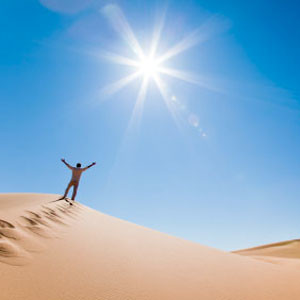How to Overcome Heat Stroke and Heat Exhaustion
April 21, 2016 by admin
Filed under General Advice
 Heatstroke and Heat exhaustion are two potentially serious conditions that can occur if you get too hot.
Heatstroke and Heat exhaustion are two potentially serious conditions that can occur if you get too hot.
They usually happen during a heat wave or in a hot climate, but can also occur when you’re doing very strenuous physical exercise.
HEAT STROKE
Heat stroke is a condition marked by fever and often by unconsciousness, caused by failure of the body’s temperature-regulating mechanism when exposed to excessively high temperatures. Heat stroke is also known as sun stroke. Heat stroke is a severe heat illness, defined as hyperthermia with a body temperature greater than 40.6 Celsius (105.1 Fahrenheit) because of environmental heat exposure with lack of thermoregulation. Heat stroke is distinct from a fever, where there is a physiological increase in the temperature set point of the body. The term ‘stroke’ in “heat stroke” is a misnomer in that it does not involve a blockage or hemorrhage of blood flow to the brain.
SYMPTOMS OF HEATSTROKE
- High body temperature: A body temperature of 104 Fahrenheit (40 Celsius) or higher is the man warning sign of a heat stroke.
- Altered mental state or behavior: Changes in brain function, such as confusion, memory loss, defects in judgment or thought, unusual or strange behavior.
- Alteration in sweating: In heat stroke brought on by hot weather, your skin will feel hot and dry to touch.
- Nausea and vomiting: In heat stroke you may feel sick to your stomach.
- Flushed skin: In heat stroke your skin may turn red as your body temperature increase.
- Rapid breathing: Your breathing may become rapid and shallow.
- Racing heart rate: Your pulse may significantly increase because heat stress places a tremendous burden on your heart to keep cool your body.
- Headache: Symptom of pain anywhere in the region of head or neck.
HEAT STROKE PREVENTION
- Do not exert yourself outdoors.
- Drink a glass of water every hour.
- Wear loose, light coloured clothes in light fabrics like cotton.
- Cover your head and face. Stay in the shade when outside.
- Open the windows of your home if it becomes too hot indoors. Use hand fans.
- Avoid caffeine and alcohol which accelerate dehydration.
HEAT EXHAUSTION
Heat exhaustion is a severe form of heat illness. Heat exhaustion is caused by the loss of water and electrolytes through sweating. Heat exhaustion is a warning that the body is getting too hot. The person may be thirsty, giddy, weak, uncoordinated, nauseous and sweating profusely. The body temperature is usually normal and the pulse is normal or raised. The skin is cold and clammy. Although heat exhaustion often is caused by the body’s loss of water and salt.
SYMPTOMS OF HEAT EXHAUSTION
- Confusion: – It is referred to as disorientation which means having hard time focusing or making decision.
- Dark colored urine:-Urine that’s a deeper color rather than the usual straw to yellow color.
- Dizziness:-A feeling that you are about to faint or pass out. If lightheadedness gets worse, it can lead to a feeling of almost fainting or a fainting spell.
- Fainting: – Brief loss of consciousness due to a drop in blood flow to the brain. Medical name foe fainting is “syncope”.
- Fatigue: – Fatigue can be expressed as lack of energy and motivation. Extreme tiredness resulting from mental or physical exertion or illness.
- Headache: – Symptom of pain anywhere in the region of head or neck.
- Muscle or abdominal cramps:-Abdominal muscle cramp also known as abdominal rigidity is a powerful, involuntary contraction of the muscles of the abdomen. This is a common injury among athletes.
- Nausea, vomiting and diarrhea: – Nausea, vomiting and diarrhea are caused by viruses. These illnesses are usually self limiting, which means symptoms will resolve on their own in a few days.
- Heavy sweating: – Heavy sweating is caused due to excessive heat and various physical factors.
- Rapid heartbeat: – Excessive heat causes exhaustion which in turn makes your heart beat faster.
TACKLING HEAT EXHAUSTION:-
- If a person is showing signs of heat exhaustion, it’s essential to get him or her out of the heat and into some shade.
- Drinking plenty of fluid ( water, fruit juice or a rehydration drink, such as a sports drink but avoid caffeine and alcohol).
- Remove any tight or unnecessary clothing.
- Take a cool shower, bath or sponge bath.
- get them to lie down in a cool place
- Apply other cooling measures such as fans or ice towels.
- If such measures fail to provide relief within 15 minutes, seek emergency medical help, because untreated heat exhaustion can progress towards a heat stroke.







